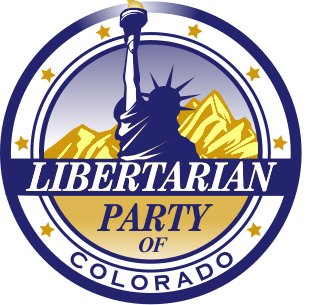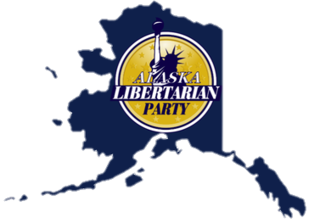
The Libertarian Party (LP) is a political party in the United States that promotes civil liberties, non-interventionism, laissez-faire capitalism, and limiting the size and scope of government. The party was conceived in August 1971 at meetings in the home of David F. Nolan in Westminster, Colorado, and was officially formed on December 11, 1971, in Colorado Springs. The organizers of the party drew inspiration from the works and ideas of the prominent Austrian school economist, Murray Rothbard. The founding of the party was prompted in part due to concerns about the Nixon administration, the Vietnam War, conscription, and the introduction of fiat money.
Carla Howell is an American politician, small government advocate and activist. She was the Libertarian Party of Massachusetts candidate for Massachusetts State Auditor in 1998, U.S. Senate in 2000, and Governor in 2002. She then served in multiple leadership positions in the U.S. Libertarian Party. She has also organized tax-cut initiative ballot measures in Massachusetts and worked for the Libertarian National Committee.

The Peace and Freedom Party (PFP) is a left-wing political party with ballot status in California. Its first candidates appeared on the 1966 New York ballot. The Peace and Freedom Party of California was organized in early 1967, gathering over 103,000 registrants which qualified its ballot status in January 1968 under the California Secretary of State Report of Registration.
Ballot access are rules and procedures regulating the right to candidacy, the conditions under which a candidate, political party, or ballot measure is entitled to appear on voters' ballots in elections in the United States. The jurisprudence of the right to candidacy and right to create a political party are less clear than voting rights in the United States. However, the U.S. Supreme Court has established in multiple cases that the federal constitution does not recognize a fundamental right to candidacy, and that state governments have a legitimate government interest in blocking "frivolous or fraudulent candidacies". As election processes are decentralized by Article I, Section 4, of the United States Constitution, ballot access laws are established and enforced by the states. As a result, ballot access processes may vary from one state to another. State access requirements for candidates generally pertain to personal qualities of a candidate, such as: minimum age, residency, and citizenship. Additionally, many states require prospective candidates to collect a specified number of qualified voters' signatures on petitions of support and mandate the payment of filing fees before granting access; ballot measures are similarly regulated. Each state also regulates how political parties qualify for automatic ballot access, and how those minor parties that do not can. Fundamental to democracy, topics related to ballot access are the subject of considerable debate in the United States.

The New York State Right to Life Party was a minor anti-abortion American political party that was active only in the state of New York and was founded to oppose the legalization of abortion in New York State in 1970.
The Oklahoma Libertarian Party is the state affiliate of the Libertarian Party in Oklahoma. It has been active in state politics since the 1970s, but due to Oklahoma's ballot access requirements the party has been an officially recognized party during only portions of the last twenty-five years. In 2016, The Oklahoma Libertarian Party regained ballot access. The state party has secured ballot access through at least 2024.

The Green Party of Oklahoma is a political party in the U.S. state of Oklahoma. It was formed in 2002 through a gradual coalition of various state green groups and received its accreditation from the Green Party of the United States (GPUS) in May 2005. Its stated aims are a commitment to environmentalism, non-violence, social justice, and grassroots democracy.

The Libertarian Party of New York (LPNY), is the affiliate of the Libertarian Party in the U.S. state of New York. Due to changes in New York State election law in 2020, the Libertarian Party lost its ballot status. It is the recognized affiliate of the national Libertarian Party.
Loretta Nall is the founder of the United States Marijuana Party, which calls for the legalization of cannabis. She was a write-in candidate for governor of Alabama in 2006.

The Libertarian Party of Washington (LPWA) is the state-affiliate of the national Libertarian Party in the state of Washington, the third-largest political party in the state and country.
The New Jersey Conservative Party, formerly abbreviated as the NJCP, now as CP-NJ, is a conservative political party in New Jersey, United States.

The Libertarian Party of Colorado (LPCO) is the Colorado affiliate of the national Libertarian Party (LP).

The Libertarian Party of Texas is the state affiliate of the Libertarian Party in Texas.

In New York State, to obtain automatic ballot access, a party must qualify every two years by receiving the greater of 130,000 votes or 2% of the vote in the previous gubernatorial election or presidential election. In years with a gubernatorial election or presidential election a party must run a gubernatorial candidate or a presidential candidate to be eligible for automatic ballot access; if 130,000 voters vote for that candidate on their party line, they have qualified the party for the next two years until the following presidential or gubernatorial general election whichever one comes first. A party that is not qualified may run candidates by completing a petition process. Parties are also allowed to cross-endorse candidates, whose votes are accumulated under electoral fusion, but any parties must cross-endorse both the governor and lieutenant governor candidates for fusion to apply. Parties that are already qualified must issue a Wilson Pakula authorization if they cross-endorse someone not enrolled in that party; there are no restrictions on who can be nominated on a non-qualified ballot line, as these lines are determined by filing petitions.
The Virginia State Board of Elections (SBE) was created in 1946 as a nonpolitical agency responsible for ensuring uniformity, fairness, accuracy and purity in all elections in the Commonwealth of Virginia. The SBE promotes the proper administration of election laws, campaign finance disclosure compliance, and voter registration processes in the state by promulgating rules, regulations, issuing instructions, and providing information to local electoral boards and general registrars. In addition, the SBE maintains a centralized database of statewide voter registration and election related data.
Electoral reform in Alabama refers to the efforts made to change the voting laws in the Yellowhammer State. In 2006, HB 711 was introduced to use preferential ballots for overseas military voters' it was passed by the Alabama House of Representatives. In March 2007, the 11th Circuit Court of Appeals heard arguments as to whether Alabama election law unfairly restricts third-party and independent candidates from the state ballot. Candidates are required to collect signatures from 3% of the total number of voters who voted in the previous gubernatorial election in order to gain ballot access. Ordinarily, such candidates would gather signatures at the polling place at the party primary, but Alabama made it more difficult by moving the deadline for signature turn-in to the date of the primary. Alabama ranks third nationally in disenfranchising formerly incarcerated citizens. One out of every 14 Alabama residents is disenfranchised. To regain the right to vote, individuals convicted of crimes of “moral turpitude” that have completed a felony sentence must apply to the Alabama Board of Pardons and Paroles for a Certificate of Eligibility to Register to Vote. As soon as you apply for a Pardon you automatically receive the right to vote back. This is the new rule of law and was passed through the House and the Senate due to voter disenfranchisement. In 2007, HB 192 was introduced to join the National Popular Vote Interstate Compact, but it failed in the Constitution & Elections committee.

The Arizona Libertarian Party (AZLP) is the Arizona affiliate of the national Libertarian Party (LP) and has been active since its foundation on October 7, 1972.

The Libertarian Party of Alaska is the affiliate of the Libertarian Party (LP) in Alaska, headquartered in Anchorage.

The 2022 United States House of Representatives elections in Alabama were held on November 8, 2022, to elect the seven U.S. representatives from the state of Alabama, one from each of the state's seven congressional districts. The elections coincided with other elections to the House of Representatives, elections to the United States Senate, and various state and local elections.
The Libertarian Party of Wyoming (LPWY) is the affiliate of the US Libertarian Party (LP) in Wyoming, headquartered in Riverton. As of 2021 it was the third-largest political party in Wyoming by voter registration, with a share of votes cast that has exceeded 5%.














